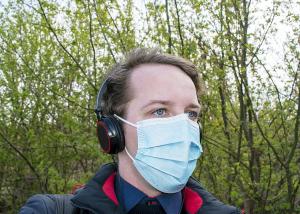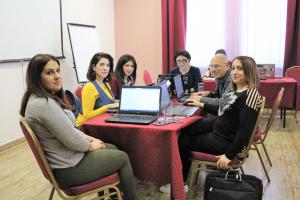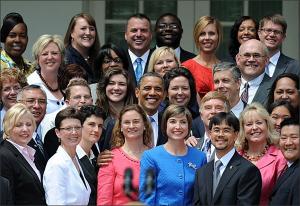 The famous words from Deuteronomy have long been my marching orders as a teacher of theology: “Hear, Israel! YHWH our God is one YHWH! You shall love YHWH with all your heart (your intelligence), all your life, and with all your strength. Guard these words that I am commanding you today with your heart (your intelligence). Recite them to your children and talk about them when you are at home and when you are away, when you lie down and when you rise” (Deut.6:4-7). Though the text goes on in the next verse to command binding all this as a sign on your hands, forehead, and doorpost—as many Orthodox Jews still do—I only attach a mezuzah (Hebrew “doorpost”) as my own reminder, avoiding the phylacteries that mark a serious Orthodox believer. Ever since I first read those words over 50 years ago, I have heard them sounding continually in my “intelligence,” whose seat in Hebrew anthropology is the heart. My role has been to teach, and I have tried to do so since at least 1968, the year of my entrance into seminary.
The famous words from Deuteronomy have long been my marching orders as a teacher of theology: “Hear, Israel! YHWH our God is one YHWH! You shall love YHWH with all your heart (your intelligence), all your life, and with all your strength. Guard these words that I am commanding you today with your heart (your intelligence). Recite them to your children and talk about them when you are at home and when you are away, when you lie down and when you rise” (Deut.6:4-7). Though the text goes on in the next verse to command binding all this as a sign on your hands, forehead, and doorpost—as many Orthodox Jews still do—I only attach a mezuzah (Hebrew “doorpost”) as my own reminder, avoiding the phylacteries that mark a serious Orthodox believer. Ever since I first read those words over 50 years ago, I have heard them sounding continually in my “intelligence,” whose seat in Hebrew anthropology is the heart. My role has been to teach, and I have tried to do so since at least 1968, the year of my entrance into seminary.
It has never been at all clear to me what the difference is between preaching and teaching; for me, you simply cannot have one without the other. After finishing a PhD in Hebrew Bible studies, I became a pastor and quickly became for my parish a Bible educator. I was the Associate Pastor of the church, and very early in my time there, established, with the blessing of the senior pastor, a Wednesday night worship service that I led, along with a regular class of Bible study on Sunday morning as well as a weeknight Bible class at the local university. During that worship service, we focused on the issue of world hunger; I placed a battered black pot, given to me by a member, at the front of the sanctuary and asked participants to fast one meal a week, and to place the money not spent on that missed meal into the pot each week. During the two years of that service, we raised over $20,000 and sent it to UMCOR, the United Methodist Committee on Relief. I taught myself, and my congregation, about the many and complex issues of hunger, and all of us were blessed again and again as we worshipped and acted in response to this particular world catastrophe. I preached each week, but I certainly also taught, both in worship and in the various classrooms I found myself in.
Then for 36 years following my brief pastoral ministry I more traditionally taught in two schools of higher education, one an undergraduate institution for three years, and the other a theological graduate school for 33 years. Since my formal retirement from my faculty position, I have had more than a few occasions to teach what I love in numerous settings. But whoever could have imagined just how resonant would those ancient words from Deuteronomy be that commanded us to teach “when we are at home”? We are certainly home now! But fortunately, the teaching has not been put on hold, as so much of our lives have been during the ravages of the virus. Thanks to the blessings of Zoom, the teaching of theology and Bible goes on. In fact, it has in our Los Angeles congregation even accelerated.
My wife and I lived in Dallas, TX for nearly 40 years. Dallas is a place of wide- open skies, fabulous sunsets, and very large churches. Before my wife was ordained as a clergywoman, we attended a downtown church with some 2000 members; that church was hardly considered large in the city of Dallas, where one United Methodist church boasted about 15,000 members. In these large churches, education was a very important component. After my wife’s ordination, she was assigned to small congregations for a time, but was finally asked to serve as a staff member of an 8,000-member church. That church had some 45 adult church school classes. We were both used to enormous educational ministries in the churches we knew well. When we moved to Los Angeles to be close to children and grandchildren, we soon discovered that the church we chose to affiliate with had practically no adult educational ministry at all! It was frankly shocking to us. The total offering was a weekly event after the 10:00AM worship service, attended by 20-30 people. That was it!
Part of the reason for the paucity of opportunity was two-fold: first, the 10:00 service time left no real time for pre-service classes, and the post-service time was equally limited; second, there really was little if any possibility for mid-week educational offerings due to the terrible LA traffic that made any return to the church well-nigh impossible. But now comes COVID-19, that nasty bug that has upended all of our lives, has brought misery and death to thousands of our citizens, and has driven us off the roads and into our homes. Zoom meetings quickly became the norm for us, with Sunday worship done on the platform, two brief prayer services on Tuesdays and Thursdays were added, and now another member of the church and I have begun a theology class that we call “God Talk” on the first and third Tuesdays of the month. Now that more of us are familiar and at least partially comfortable with Zoom, we can deliver education on line in ways we simply never contemplated before.
Is Zoom better than in-person meetings? Hardly! But it works. It presents us to one another in the virtual flesh; we can see one another speaking and listening, and those of us who lead have the chance to fulfill our calling as teachers as well as being able to learn from our members what they have to offer to us. I am beginning to think that this forced virtual experience may have opened to us a way significantly to increase our educational opportunities even after the beast has loosened its grip enough that we can return to the physical church that we all love. I know well that Zoom is getting a huge workout at the moment, and that many are heartily sick of those virtual meetings; my own daughter has more Zoom meetings for her work than she can usually stomach. Still, when the virus allows for more face-to-face experiences again (or “mask-to-mask” may be more like it), Zoom education may be more acceptable than it is currently.
“Teach when you are at home,” says the old commandment, and we are finding that to be true in ways we could never have conjured. Little good may be said about COVID-19, but in this small way it has demanded that we think anew about our theology education. We are doing that, and I hope we will continue our pursuit of new avenues to offer education in theology for our members and for others who may find in us worthy guides for them as well. I am hardly grateful to the virus, but it has demanded from us new thinking and creativity, new employment of our “hearts” and “lives” and strengths” as we express the ancient truths in very new ways.
(Images from Wikimedia Commons)











